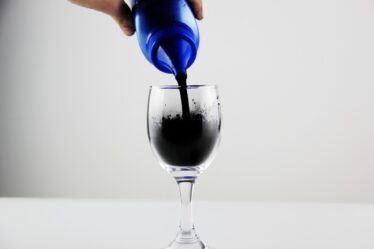
It is necessary to brush your teeth at least twice a day, in the morning and in the evening. Everybody knows this rule, but they give themselves a break if suddenly they run out of toothpaste and have not had time to buy a new one. And for nothing!
The lack of a toothpaste is not a reason to refuse brushing, because toothpaste can be easily replaced with natural, useful and no less effective products.
You can brush your teeth…
Water
If your teeth are healthy, water brushing is a suitable alternative to toothpaste. Water cleans your teeth from pathogenic bacteria and directly from the remains of food eaten, which is the main purpose of tooth brushing. That is, water has no less anti-bark effect, because tooth decay develops where the teeth are poorly cleaned.
Activated charcoal
Almost everyone has activated charcoal in his home medicine cabinet. In order to brush your teeth, you will need only two tablets of activated charcoal. In this way, teeth were used in ancient times, however, used to brush teeth at the time, not activated charcoal, and charcoal ash. So if you are out of civilization, for example, in a hike, you can safely use oven ashes and charcoal from a fire to brush your teeth. It is believed that the best charcoal for brushing your teeth is linden.
How to use? The tablets of activated charcoal should be chewed well. Take a toothbrush, soak it under a jet of water and start brushing your teeth. At the end, rinse your mouth well. If you use ash, you should rub it into your teeth first and then start brushing.
By the way, activated carbon will not only clean your teeth from food and plaque residues, but also bleach them.
Salt
Salt is quite common for cleaning teeth, it effectively destroys microbes in the mouth and helps to strengthen weak gums, which often bleed.
Back in 1674, the Dutch inventor Anthony van Leeuwenhoek made two outstanding discoveries. First, he discovered the world of germs, and second – a way to destroy them in the mouth with salt. The discovery was made by chance, when under the lens of the microscope washed off the scientist’s teeth. Anthony van Leeuwenhoek saw many germs, but after rubbing his teeth with a rag with salt, he did not find any germs on the new washout. The scientist spent the rest of his life brushing teeth with salt and lived, by the way, 93 years.
How to choose toothpaste? Dentist’s recommendations
Salt not only effectively cleans teeth, but also heals gums, prevents rotting processes, removes bad breath, salt corrodes tartar and thus whitens enamel.
Tooth brushing you can use simple table salt and sea salt, which is rich in minerals and trace elements. Calcium, magnesium, potassium, silicon, sodium, phosphorus, nickel and iron will strengthen gums, and iodine and manganese will have a bactericidal effect.
How to use? Salt should be fine. Toothbrush should be wet and wet bristles dip in salt. Further cleaning of teeth follows the usual pattern.
You can make “home” toothpaste based on salt, for example, by mixing salt and vegetable oil.
There is another way to brush your teeth – you need to finely grind sea salt, put a teaspoon under your tongue, when your mouth will get a lot of saliva, dissolve the salt in the saliva and brush your teeth and gums well with this salt.
The only drawback of the salt is that if your enamel is damaged and your teeth are sick, then brushing your teeth may be painful at first, but gradually the symptoms disappear and your teeth strengthen.
Soda
Soda should be brushed in the same way as salt, but it is recommended to use it less often, because unlike salt, soda is very irritating to the gums.
Other handy products
Piece of bandage – it is usually used to clean the teeth of small children, but for adults it will also fit and get rid of plaque on the teeth. Wrap your finger with a piece of wet bandage and start brushing your teeth.
Is anesthesia treated for dentophobia? How to get rid of fear of the dentist
Instead of toothpaste, you can chew young wheatgrass – the chewing process turns the grass into small soaked cellulose fibers, and each fiber, like a brush, cleans the teeth. Also, the juice of this grass has an alkaline reaction.
And avid smokers are advised to brush their teeth with flour from iris roots. The root is crushed, dried in an oven and then used. Iris prevents and treats tooth decay and paradontosis. Also a good remedy is flour from the horsetail plant – stops bleeding and includes silicon, which has a strengthening effect, prevents tooth decay.



